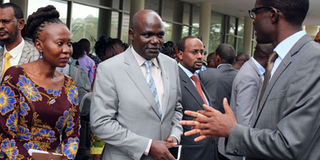Ballot printing companies had tender war in Zambia

From left: IEBC Commissioner Roselyn Akombe, Chairman Wafula Chebukati and CEO Ezra Chiloba at Intercontinental Nairobi Hotel on June 15, 2017. PHOTO | DENNIS ONSONGO | NATION MEDIA GROUP
What you need to know:
The allegations must have brought a sense of déjà vu to the head honchos of Al Ghurair in their air-conditioned offices in Al Muraqabat in Dubai in the United Arab Emirates.
This time last year, they faced similar accusations by the opposition parties in Zambia.
Zambia’s opposition questioned why the Electoral Commission of Zambia awarded Al Ghurair the contract over the South African firm Ren-Form Printing Company, which until then had been printing ballot papers for the ECZ.
The tussle over the printing of ballots for this year's General Election closely mirrors the happenings in Zambia a year ago.
At the centre of the controversy was the Dubai-based Al Ghurair Printing and Publishing, which was recently awarded a Sh2.5 billion tender by the Independent Electoral and Boundaries Commission to print 130 million ballots.
The National Super Alliance, led by presidential candidate Raila Odinga, has opposed the awarding of the tender through single sourcing. It further claims that people close to the Jubilee administration are working closely with the firm to steal the election for President Uhuru Kenyatta.
The allegations must have brought a sense of déjà vu to the head honchos of Al Ghurair in their air-conditioned offices in Al Muraqabat in Dubai in the United Arab Emirates. This time last year, they faced similar accusations by opposition parties in Zambia.
Zambia’s opposition questioned why the Electoral Commission of Zambia awarded Al Ghurair the contract over the South African company Ren-Form Printing, which, until then had been printing ballots for the ECZ.
Following a challenge by Ren-Form, the Zambia Public Procurement Authority cancelled the tender and ordered it to be re-advertised, but Al Ghurair won it again. Zambia’s electoral commission said the company met its specifications on security features on the ballots, but the Opposition smelled a rat.
Following opposition protests, officers from Zambia’s electoral body offered to sponsor one agent from each presidential candidate to witness the printing of the ballots to allay any suspicions.
In the wake of Nasa’s protests against IEBC’s move to award the contract to Al Ghurair, the IEBC chief executive Ezra Chiloba and the commission’s chairman Wafula Chebukati have made a similar offer to Nasa.
Furthermore, as it was the case in Zambia, the company that had initially challenged the awarding of the contract to Al Ghurair by the IEBC is South Africa's Paarl Media. Last October, Paarl successfully petitioned the Public Procurement Administrative Review Board to cancel IEBC’s contract to Al Ghurair. Though the latter lost its appeal in April, it still got the contract through restricted tendering, which Nasa has now called into question.
The Zambian opposition accused Al Ghurair of working closely with the government of President Edgar Lungu to rig the elections. They claimed that prior to the polls, President Lungu travelled to Saudi Arabia where he met Al Ghurair officials. President Lungu narrowly defeated opposition candidate Hakainde Hichilema.
In Kenya and other African countries, the supply of election material is usually an affair riddled with competing interests.





